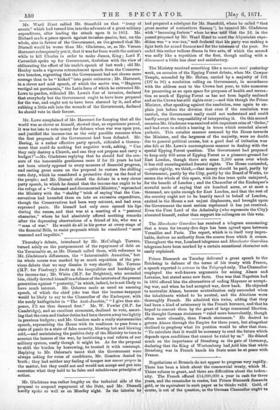Thursday's debate, introduced by Mr. McCallagh Torrens, turned solely on
the postponement of the repayment of debt on the Terminable or, as Mr. Disraeli called them, with reference to Mr..Gladstone's diffuseness, the "Interminable Annuities," but its whole course was marked by so much repetition of the pre- vious debate that we may dismiss it very shortly. Mr. Torrens (hi.?. for Finsbury) dwelt on the inequalities and hardships of the income-tax ; Mr. White (M.P. for Brighton), who seconded him, chiefly devoted himself toa defence of the interests of the present generation against "posterity," in which, indeed, he is not likely to have much interest. Mr. Osborne made as usual an amusing speech, of which the chief joke was that the income-taxpayer would be likely to say to the Chancellor of the Exchequer, with the needy knifegrinder in "The Anti-Jacobin," "I give thee six- pence, I'll see thee damned first." Mr. W. Fowler (M.P. for Cambridge), and an excellent economist, declined to vote, assert- ing that the corn and timber duties had been thrown away too lightly in previous budgets ; and Mr. Goschen made a really statesmanlike speech, reproaching the House with its readiness to pass from a state of panic to a state of false security, blowing hot and blowing cold,—and maintaining the positive duty of the Ministry to turn to account the lessons of the war, by instituting a real reform of our military system, costly though it might be. As for the proposal to shift the burden by borrowing, he treated it with contempt. Replying to Mr. Osborne's taunt tha-t the Government were always asking for votes of confidence, Mr. Goschen denied its truth ; they had neither any feeling of temper nor amour propre in the matter, but they could not and would not accept and put into -execution what they hold to be false and mischievous principles of action.
































 Previous page
Previous page